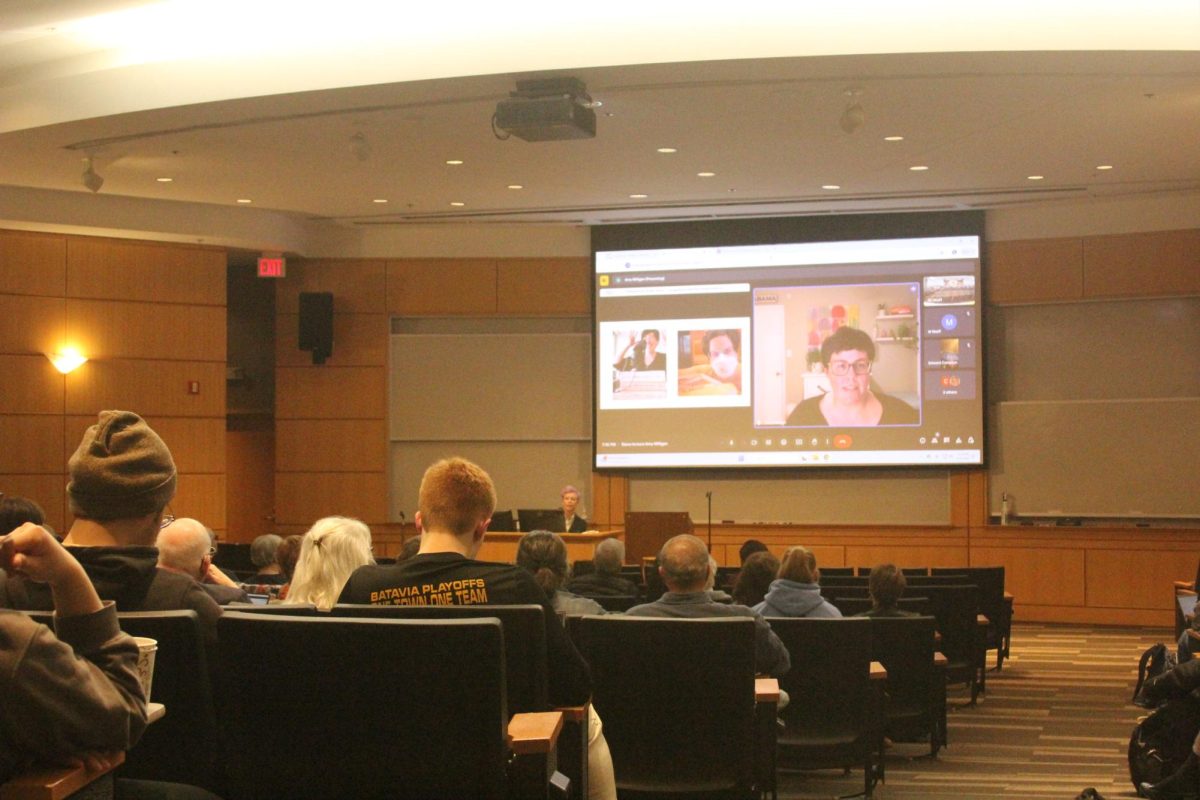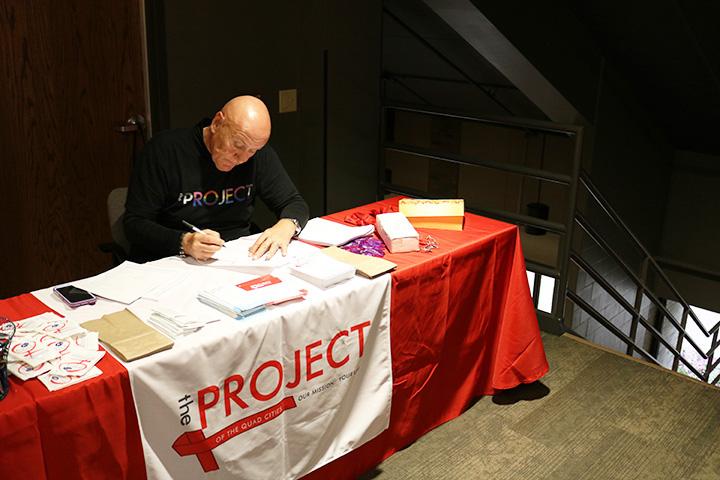Augustana student groups +Impact and Love along with The Project of the Quad Cities (TPQC) organized a sex education seminar on the prevention of HIV/AIDS/ STI at the Blackbox Theatre in the Brunner Centre on Tuesday 10th October. The informational session began at 10.30am following which students could choose to be tested for HIV free of charge until 3pm.
Testing was carried out by three members of The Project of the Quad Cities (TPQC), a non-profit organization which has provided services to those at risk of or suffering from HIV/AIDS/STI for thirty years. According to senior Natalie Trujillo, president of +Impact and a Psychology, Sociology, and Women and Gender Studies major, TPQC approached +Impact during the Activities Fair this August and hopes to continue working with the Augustana community.
The many students who attended the informational session were welcomed by Trujillo and provided with information sheets on STDs (compiled by the Centers for Disease Control and Prevention), following which senior Jaime McLean, sexual health chair for +Impact and a Women and Gender Studies major, and junior Dana Mas, co-educator for +Impact and a Psychology major, invited students to participate in an online quiz in order to test their knowledge of HIV/AIDS/STI. The answers revealed that while most students were informed about major issues, there were also some common misconceptions, which the speakers then corrected. Commenting on the quiz, Trujillo said “I wasn’t too surprised about the responses to the quiz. Some students have already learned these things in other classes or sex education. I was happy to know that most students are aware and educated on the topic.”
The speakers shared statistical information from the CDC with the audience. For example, 22% of all new HIV diagnoses in the US in 2015 were in the age range 13-24. Yet of the estimated 60, 900 youth living with HIV in the US at the end 0f 2013, 51% were undiagnosed. In the case of STDs, although 15-24 year olds make up just over a quarter of the sexually active population, thy account for half of the 20 million new STDs diagnosed in the US each year. Reported cases of chlamydia, gonorrhea and syphilis rose in the groups 12-16 and 15-24 from 2012-2016. The speakers drew on these statistics to explain that sexual health screening is so important because treatment options may be more varied and more accessible in early stages of infection. For example, those aware that they are at very high risk for HIV from an HIV positive sexual partner has the option of PrEP (Pre-exposure prophylaxis), a pill which taken consistently can prevent infection. Although the speakers acknowledged that the idea of testing might appear daunting, they explained that knowing one’s status would allow protective measures to be taken, particularly with regard to partners and children. The speakers then explained effective preventive measures, particularly the use of male and female condoms and dental dams during any form of sexual intercourse.
“Know you status,” said Clyde Lipp of TPQC. “Have open dialogue with who you’re having sex with.” Lipp then provided the audience with information on HIV transmission methods, such as exchange of blood and bodily fluids and needle sharing, and elaborated on the prevention strategies which the speakers had addressed. He remarked also on recent cases of HIV infection handled by TPQC, where individuals were infected by sharing needles at tattoo parties currently popular in the Quad Cities area as well as cases of military personnel contracting the disease through mass vaccinations. Lawrence Weatherly, also of TPQC, elaborated on the importance of prevention strategies, adding “You are your best protection, your best security.”
Following the session, students were able to ask questions of the speakers anonymously through an online platform. Certain questions addressed the dilemma of addressing the issue of testing with romantic partners, or the possibilities of continuing sexual relationships with those partners after positive diagnoses. Once again +Impact and Project Quad Cities members emphasized the importance of protection and education in dealing with these issues.
Students were given the opportunity to be tested for HIV by TPQC after the session. Trujillo said “The Project actually ran out of tests and ended up testing almost 30 students. In the past when they had come to Augie, the turnout was nowhere near that. It may seem like a small number but when you consider that this testing was only HIV testing it really is amazing that so many students stepped up to know their status.” +Impact co-educator Dana Mas added “This was a wonderful problem to have since more students wanted to get tested than we had anticipated. Students can still get tested for free at The Project, and we hope to have at least one other event with The Project on campus to offer free STI testing this year.”
Freshman and Asian Studies major Katrina Rodriguez explained that she participated in the test because as a member of +Impact, she wanted to “demonstrate to other students that HIV testing is something everyone can do without feeling scared or awkward.” Trujillo acknowledged this prevailing fear of HIV/AIDS/STI testing. She said “I definitely know in talking to other students on campus that many wanted to come but were nervous or scared. I think the stigma of being tested and talking about this topic is still difficult. I hope that this event has somewhat helped students realize that this is important and something that needs to be discussed.”
Categories:
+Impact partners with The Project of The Quad Cities to offer sex education and HIV testing
October 19, 2017
Clyde Lipp, Program Manager at the Project of the Quad Cities, goes through paperwork. Photo by Brady Johnson
0
More to Discover







































































































